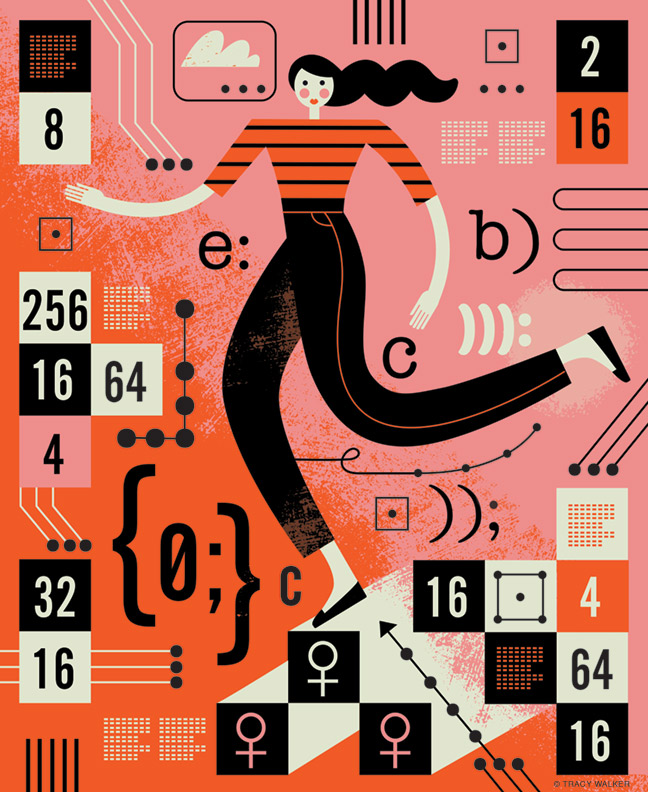
Reflections of a computer science outsider.
By Olivia O’Dwyer
In seventh grade, a boy I liked told me it was weird for me to do math league. So I stopped, because I wanted him to like me. I resumed in high school a few years later, but by that time my self-consciousness had solidified, cementing doubts that would follow me for the rest of my education.
I didn’t take a computer science class in high school; it never even occurred to me, despite my facility with math and science. I had no idea what it was, and the notion of pursuing something I didn’t know if I’d be good at scared me.
I don’t think I felt weird doing math league or intimidated by computer science because I was a girl. But I believe that far fewer boys feel this way growing up, for many reasons. The math and tech figures we see all around us—in movies and news stories, in our families and communities, at the top of tech companies—are predominantly male.
I took my first computer science class during my first semester of college. I didn’t even know how to run a program, let alone write one. I spent many office hours feeling overwhelmed by all the things I didn’t know and didn’t even know how to ask about. But the first friend I made that year was a girl who was just as confused as I was. We attended office hours together and spent a memorable 24 hours in a dorm basement grinding out our final project. By the end of the semester, I was hooked on computer science. Yet it still took me another nine months to convince myself to switch my major to computer science. At the end of my sophomore year, I became a teaching assistant in an introductory computer science class—but I still felt imposter syndrome. I was convinced that everyone knew more than I did, and that I was underqualified for every internship I applied for. Even four successful years at Penn did not wipe away my doubts. Only when I secured a software engineering job at a large tech company after four years at Penn did I begin to consider myself a ‘real’ programmer. This change in how I viewed myself was not the product of any new material I mastered, but of my belated realization that many of the talented computer scientists I look up to struggle with similar doubts and insecurities.
Until I sat down recently to think about this, I hadn’t quite realized that only one of the 21STEM classes I’ve taken at Penn has been taught by a female professor. A single professor, my freshmen year, for a half-credit laboratory. Yet I remember that limited encounter vividly. She spoke about her children and connected to students in a way I’ve very rarely felt in other classes. When it struck me that I never had another female professor after her, I was so shocked I had to double-check my transcript.
It started me thinking about other things. Of more than 20 tech-job interviews I’ve been through—anxiety-inducing occasions in which you are often asked to code the solution to a problem on the spot while explaining your thought process to the interviewer—only two were conducted by a female. I remember entering those interviews and feeling something in me relax, though in the moment I didn’t know why I felt that way.
Over the course of three tech internships, each of which found me working on a 10- to 20-person team, I’ve never had more than two female collaborators. In my first tech internship, there was not a single woman in the office apart from me. In my second, the only other women were fellow interns.
It took further reflection for me to realize that I’ve never had a female boss or manager. And when I think up the chain of command, I’m not sure if I’ve ever had a female superior. At one company I worked for, someone had created a 2048-style sliding puzzle game featuring the faces of the company’s executives. It was intended, as far as I could tell, as a lighthearted attempt to get the interns familiar with the company’s leadership.
Not one of the faces on the tiles was female.
As I look back, what disturbs me most is how little any of this disturbed me at the time. These absences blended into everything else that I registered as normal: the standard operating procedure, nothing out of the ordinary. I never looked at my syllabus and thought, “Oh, another male professor.” It would have been like entering a classroom and finding it remarkable to see another blackboard. Wow, 15 in a row!
Fortunately, there is another side of my personal experience in computer science at Penn. It consists of the women who have been in the trenches with me, grinding away at assignment after assignment, lifting me up, sending words of encouragement, making me ginger tea, waiting in the office hours queue with me, helping me during my own office hours as a TA. These women have pulled me up with them. I hope I have done the same for some of them. Whether it is spoken aloud or honored in quiet observance, we can only have one motto: your success is my success. It is this way because it has to be, to survive, to be happy, to learn in a meaningful way. I feel an unspoken, immediate bond with any woman who’s reached out to me for help or has admitted to me they’re struggling. I’ve been there, I tell them. I know. And you will make it through.
But if our society wants to capitalize on the full range of talent possessed by girls and young women, we need to do this better. That project must include university decisions about who is sent into classrooms to teach. It should inform tech company decisions about who conducts job and internship interviews. We must create environments where being a woman isn’t an anomaly, it’s normal. Maybe then there would be no need—as there was for me, though it was almost too late by the time I recognized it—to tell girls: No, math league can be for you, and screw any boy who tells you otherwise.
When I think about the time I quit math league, it breaks my heart. And it makes me angry. I do not blame myself for quitting. I’d been programmed by society to believe that making that boy like me was more important than exercising mastery of math. I do not even blame the boy for throwing out a thoughtless comment; he could not have known how much damage it would do. We are all complicit in this, and we can all do better in addressing the problem and creating spaces that are welcoming and inclusive to everyone.
Olivia O’Dwyer EAS’21 graduated in May with a major in computer science and a minor in creative writing. She is a software engineer in Boston.




